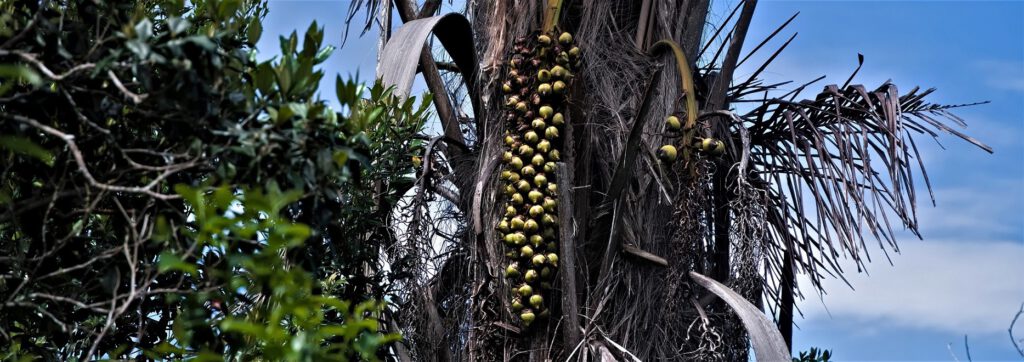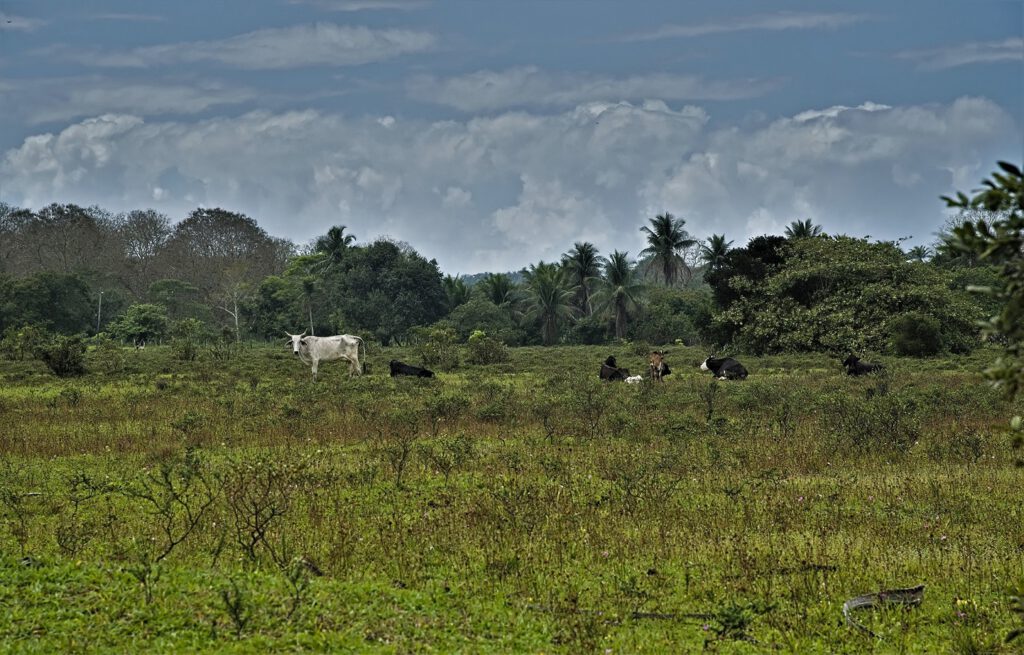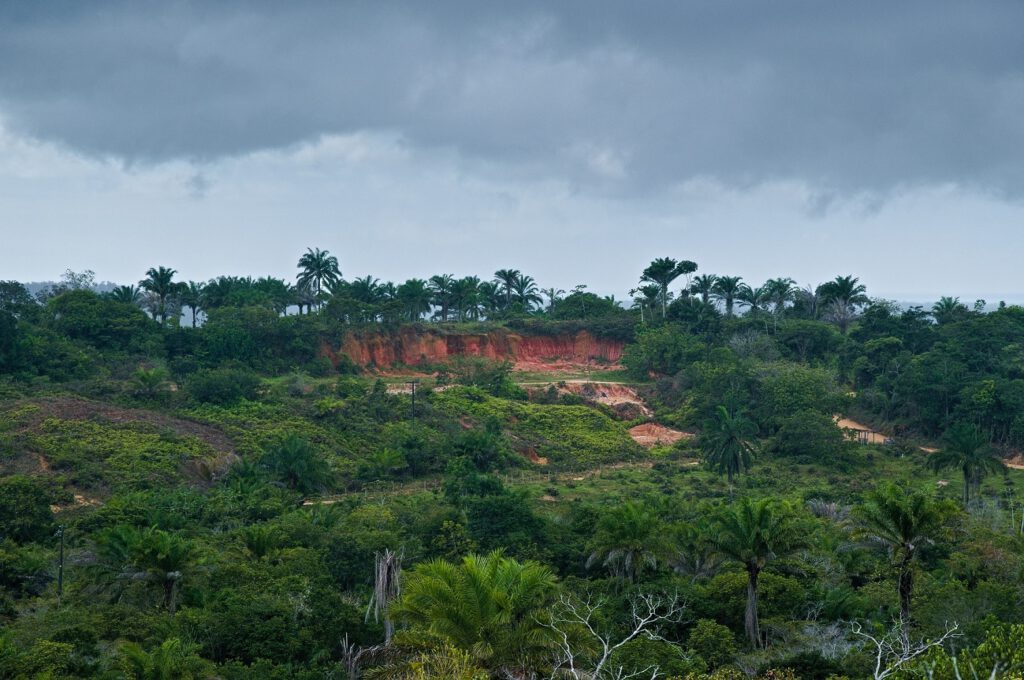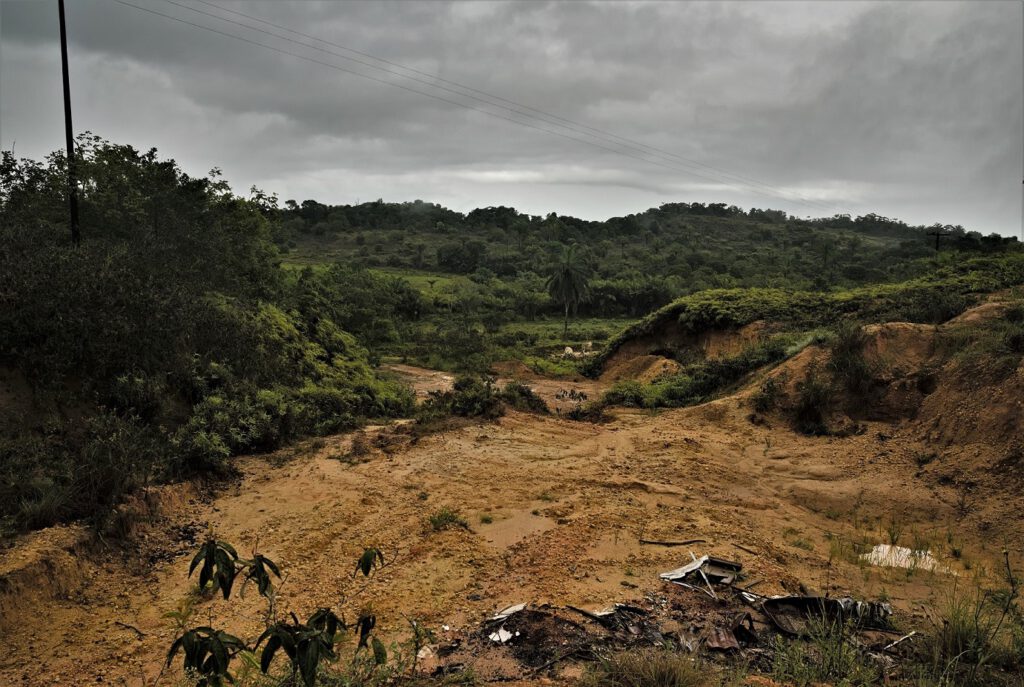The Tropical Rainforest is traditionally exploited through a method called shifting cultivation or slash-and-burn agriculture. This process involves regularly changing the areas used for farming. It starts with clearing a small section of the forest near the village. The cut branches and trees are dried and then burned. In this cleared area, mixed crops like maize, millet, cassava, and bananas are grown. Farming continues until the soil loses its fertility. Then, the community moves to a new untouched area of the forest, and the process starts again. After the original farming area has had time to recover, which can take up to 25 years, the community returns to cultivate it once more.
The exploitation of the Tropical Rainforest often involves the cultivation of monocultures in plantation farming. In this process, the diverse rainforest is cleared to make space for plantations where only one type of plant is grown. Examples of these are oil palms, coffee, cocoa, soybeans, rubber trees, and others. Plantation farming mainly aims to export the produced goods. However, due to intensive and one-sided cultivation, the soils become depleted and eventually unable to yield crops. This process leads to a reduction in biodiversity and ecological damage as the habitat for many animal and plant species is destroyed.

Brazil, along with Australia and the USA, is one of the largest exporters of beef. Extensive cattle grazing in Brazil leads to significant deforestation of the tropical rainforest. Additionally, large areas of the rainforest are cleared for the cultivation of feed crops like soybeans, which are then used as feed for livestock, including cattle. This is done to meet the increasing demand for meat products, especially in countries like Germany, where meat consumption is high.

The exploitation of the Tropical Rainforest for tropical timber is a significant problem with both ecological and social impacts. Tropical timber is highly sought after due to its unique properties such as hardness, durability, and distinctive grain. It is used in various forms, including firewood, roundwood, lumber, veneer, or plywood. Additionally, a considerable amount of the harvested timber is used for paper production.
The high demand for tropical timber leads to deforestation of rainforest areas, especially in tropical regions. Often, this deforestation occurs illegally, contributing to illegal timber trade networks and corruption. The consequences are diverse: the loss of valuable habitats and biodiversity, the release of large amounts of CO2 into the atmosphere, and the disruption of the livelihoods of indigenous communities closely connected to the rainforest.
Another aspect is the low cost of tropical timber due to low wages in these regions and the fact that trees only need to be cut down instead of being replanted. This reinforces the incentive for illegal logging and illegal timber trade practices.
The extraction of natural resources in the Tropical Rainforest, particularly in illegal forms, is another significant source of exploitation and environmental destruction. Resources such as iron ore, bauxite, gold, copper, nickel, coltan, and others are extracted from the underground layers of the rainforest. This extraction leaves deep scars on the landscape and has severe impacts on the environment and the local population.
During this mining process, not only does deforestation occur, but also deep pits are dug, and toxic chemicals are used. The use of chemicals like lead, cyanide, and mercury is widespread and has significant effects on the air and water. These chemicals can accumulate in the environment and not only harm ecosystems but also the health of people living near the mining areas.

The hunting of wildlife in theTropical Rainforest is another alarming form of exploitation. Animals such as jaguars, snakes, capybaras, caimans, and turtles are ruthlessly hunted for their fur, skins, turtle shells, feathers, and other products to be sold in markets. These products are highly sought after due to their exclusivity and demand. The hunting and trading of these animal products have devastating effects on the animal populations in the rainforest. Many of these animals are critically endangered or facing extinction. The demand for their body parts further diminishes their habitat, weakening their populations.
Moreover, the ongoing destruction of the rainforests means that the remaining animal populations are confined to isolated „islands.“ Their movements between these remaining rainforest areas become increasingly difficult, leading to genetic impoverishment, inbreeding, and an increased risk of extinction.
The loss of the Tropical Rainforest has not only ecological and economic consequences but also significant impacts on medical research and indigenous knowledge. A substantial portion of globally used medicines is based on plants found in this ecosystem. The loss of plant species, therefore, means a loss of potential remedies and a limitation in the ability to treat severe diseases. Indigenous peoples living in the rainforests have developed extensive knowledge about the healing properties of plants and their applications over generations. With the loss of the rainforest, this valuable traditional knowledge is also disappearing. There is a risk of losing entire generations of healers and knowledge keepers, leading to an irreplaceable gap in medical research and understanding of natural remedies.
